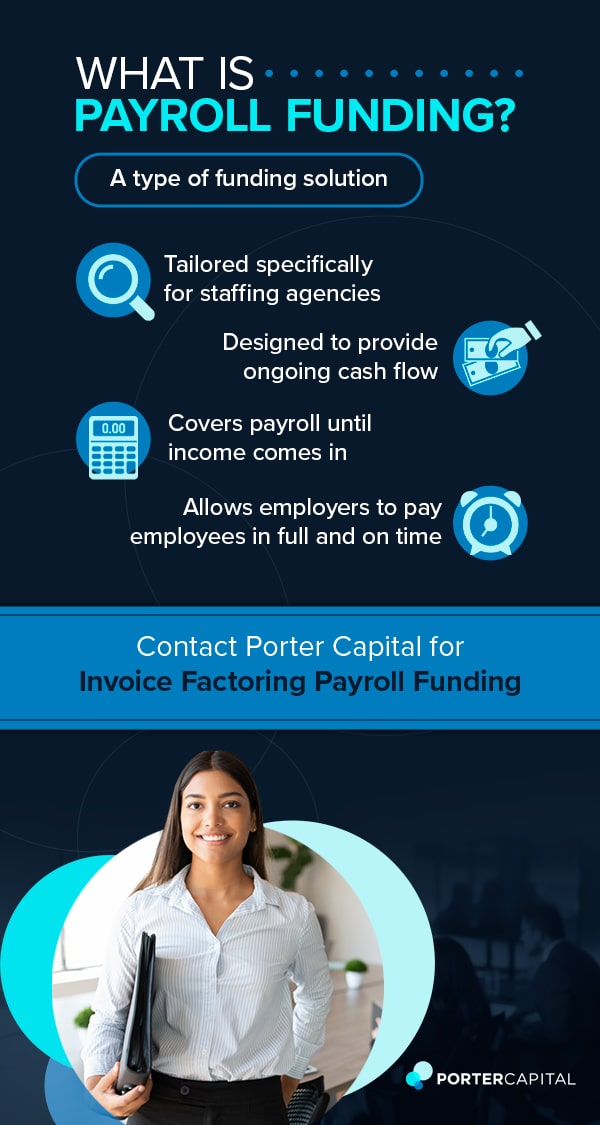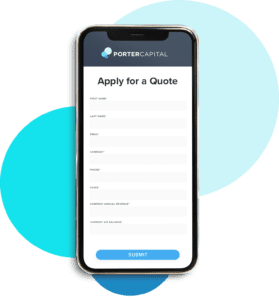Payroll funding is an alternate way for businesses to pay their employees while waiting for income from other sources, like customers paying invoices. Several varieties of payroll funding are available. These options create faster funding to settle payroll costs on time.
Table of Contents - Quick Links
What is Payroll Financing?
Payroll funding is a type of short-term business loan that gives funding to pay employees in full and on time. Usually, these loans come from alternative lenders, not banks, because expenses like payroll require a fast turnaround time. Banks and other lenders typically have a lengthy approval process. Online alternative lenders have shorter approval times, so you can access the cash you need on demand.
Understanding Payroll Financing Essentials
Several strategies exist for payroll funding. Each method works differently. Payroll funding options generally have a short repayment term of one year or less. These shorter terms lead to higher interest rates. Also, lenders who provide payroll funding usually require daily or weekly repayments rather than monthly installments. In general, payroll funding has the following specifications:
- Loan amount: Loans range from as little as hundreds up to $15,000,000.
- Interest rates: Most payroll financing has rates around 10%, but some financing options are as low as 0.75%.
- Terms: Repayment terms often range from three to 18 months.
- Repayment schedule: Unlike long-term funding options with monthly repayment, payroll financing has daily or weekly repayment schedules.
- Funding time: Many payroll financing companies can provide funds in as little as 24 hours.
Companies seeking financing often turn to bank loans or Small Business Administration (SBA) loans. While these options work well for some financing needs, they have a lengthy approval process, meaning your employees will not get paid according to schedule. Payroll financing uses faster methods to help you gain access to cash, allowing employees to receive their paychecks on time.
Related Resource: What to Do When You Can’t Make Payroll?
Enhance Your Business Growth with Premium Payroll Funding Solutions!
Explore tailored payroll funding options designed to support the financial needs of established companies like yours. Partner with Porter Capital for expert insights and seamless funding solutions that align with your business goals.
Leveraging the Benefits of Payroll Funding
Payroll funding companies offer many business advantages, including:
- Consistent cash flow: If you must often wait for outstanding invoices before paying employees, payroll funding allows regular cash access to meet weekly or fortnightly (biweekly) payroll.
- Same-day funding: Businesses receive money in their accounts in as little as 24 hours using payroll financing.
- Business growth: For growing businesses, payroll financing allows them to hire new talent and take on sizable orders without worrying about losing staff.
- Competitive client terms: Flexible payroll funding allows for longer client payment schedules because businesses can offer 30- to 60-day terms without sacrificing employee payroll schedules.
- Seasonal income balance: In particular industries where cash flow varies based on season, payroll funding provides a smooth balance to maintain consistent pay all year.
- Fewer barriers to funding: The application process for short-term financing is often short, with fewer qualifying factors than long-term loans.
Exploring the Varied Types of Payroll Financing
Payroll funding comes in three primary forms: short-term loans, business lines of credit and invoice factoring.
1. Short-Term Loan
Online lenders often provide this option to give businesses fast access to funds. Short-term loans have repayment periods of less than a year. Borrowers can receive these loans in as little as one day. Payment for short-term loans usually ranges from $2,500 to $250,000.
Loans with shorter repayment periods also have higher interest rates, usually around 10%. Though this amount is higher than most loan interest rates, it is not entirely unreasonable. It gives access to cash sooner with fewer barriers than long-term loans, allowing businesses to continue normal operations. Unlike long-term loans, a company may qualify for a short-term loan even with a lower credit score and smaller annual revenue. If you need a payroll loan for a small business, you might use this option.
2. Business Line of Credit
A business line of credit works well for substantial, unexpected expenses that could leave businesses unable to do payroll for several months. This payroll funding option gives flexibility with revolving terms not limited by the year benchmark. Companies using this funding strategy can access funds whenever necessary and only pay interest on the amount used. After you pay the amount spent, your credit returns to the original amount.
Businesses that choose this funding option often have a credit limit ranging from $10,000 to $1,000,000. Repayment terms can last six months to five years. A business line of credit typically has a lower interest rate than other payroll funding options, resting around 7%. Like other payroll funding methods, this offers access to funds in as little as one day.
Related Resource: Short-Term Loan vs. Line of Credit
3. Invoice Factoring
For those seeking payroll funding for small businesses, invoice factoring provides the solution. B2B companies must often wait on outstanding invoices for the necessary funds to pay employees. With invoice factoring, companies can share their pending invoices, and a lender will advance up to 90% of the cash value.
The lender holds the remaining percentage until customers pay invoices. Until customers pay, invoice lenders charge fees on the amount they hold. When your clients pay the invoices, your business receives the remaining invoice amount, minus any fees.
Newer businesses with shorter credit histories often benefit from this lending option. Without a credit history or high credit score, companies may struggle to find regular financing options. This lending solution focuses more on invoice value than previous repayment history or credit score.
Invoice factoring gives companies access to financing ranging from $500 to $15,000,000 in as little as a day. Rates also start as low as 0.75%. Unlike other financing options, this is not a loan, meaning it will not impact credit history
Qualifying Criteria for Payroll Funding Solutions
Qualifications for payroll funding options differ depending on the solution you choose. Here are some general requirements for each payroll financing type:
- Short-term loans: To qualify for this loan type, businesses must have verifiable income and usually nine months of operation. These loans also require a minimum credit score and minimum annual revenue.
- Business lines of credit: Companies seeking this loan often need at least one year in business. They must also have minimum credit and annual revenue to secure the loan.
- Invoice financing: This financing option also requires a minimum number of months in business and a minimum annual revenue, but these amounts are typically lower than the previous two funding options. Also, there is no minimum credit score requirement.
Most payroll funding options have a simple online application process. Businesses may need the following materials to apply:
- Business and personal information (like company name and location)
- Business financial documents
- Business and personal credit score (may not be necessary for invoice financing)
- Business bank statements and tax returns
- Existing debt schedule
Industries Primed for Payroll Funding Success
Short-term payroll funding benefits any business facing payroll gaps. These situations often happen among start-up ventures and established companies when outstanding invoices leave them short on funds. Payroll funding helps those without time to wait for a traditional bank loan. It also gives businesses with low credit ratings access to funds. Among growing enterprises, payroll funding helps them satisfy orders while keeping sufficient cash on hand for employee paychecks.
Many industries benefit from payroll funding, including:
- Staffing: With a changing job market and upfront cash needs, payroll funding for staffing companies ensures smooth operations.
- Service and technology: As the technology industry evolves, consistent funding can keep a tech company on top.
- Distribution: The buying market changes distribution needs over time. Flexible financing distributors allow businesses to adapt to highs and lows.
- Manufacturing: Every year, manufacturing has busy times and lulls. A reliable financing option for manufacturers fills in the gaps during low times.
Contact Porter Capital for Payroll Factoring
Of the payroll funding options above, invoice factoring provides the most benefits for your business. This funding option has fewer barriers to entry and lower interest rates. It also will not impact your credit score. If you need invoice factoring to fulfill your next payroll, Porter Capital can help. We have over 30 years in business, meaning you will receive reliable and trustworthy services to help your business maintain stable operations even with changing cash flows.
Porter Capital has a solid financial base to fund large deals. Clients who work with us also benefit from excellent customer service, making payroll funding easier by answering your questions throughout the process. If you want to learn more about invoice factoring, request a free quote online today.








